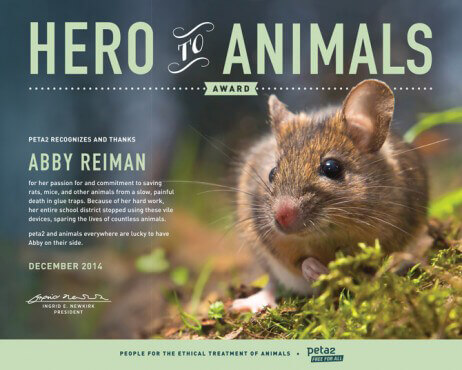How PETA Got It Done: Hundreds of Places Have Banned Glue Traps
Thanks to efforts from PETA and our supporters, hundreds of retailers and institutions have ditched glue traps—and for good reason. These killers cause many small animals—such as songbirds, squirrels, and snakes—to endure slow, painful deaths, and it’s baffling why anyone would still use these ineffective devices that spread disease.
But if PETA’s track record is any indication, those who continue to use or sell glue traps won’t for much longer. How are we decimating the glue trap industry? Here are five of the most effective ways we’ve taken on the egregious cruelty of using glue traps:
1. We revealed to the world that desperate animals endure slow, agonizing deaths in the glue.
Animals caught in these inhumane devices panic and often break bones and tear off their fur and flesh in a desperate struggle to escape. Some animals even try to chew off their own limbs to free themselves. We’ve shared numerous heart-rending stories of people who have found dead bodies stuck to these contraptions. PETA’s own executive vice president, Tracy Reiman, even documented her own account of attempting to save three mice stuck on a glue trap. These horrified accounts are the reality everyone needs to hear about.
2. PETA bought stock in businesses to ban glue traps from the inside.
PETA gets its compassionate foot in the door by any means necessary. By owning stock in major companies, we’ve urged them to stop using glue traps—and it’s in their best interests to listen up! In addition to enduring a slow, painful death, these terrified animals continue to produce urine and feces, which contain pathogens. The Centers for Disease Control and Prevention warns against the traps’ use because of the disease risk to users, customers, and employees.
3. We’ve persuaded 100 airports to ban glue traps.
After having been informed that animals stuck on glue traps can die from blood loss, shock, dehydration, or suffocation, which can take days, a whopping 100 U.S. airports—including John F. Kennedy International and Denver International—committed to banning these vile devices.
4. Our unforgettable videos and ads persuaded companies to do right by rodents.
PETA’s haunting videos and tragic images of animals’ terrifying last moments helped motivate entities such as U-Haul and Goldman Sachs to ditch glue traps. More companies than ever now realize that glue traps cause prolonged suffering and that killing is an ineffective way to control rodents. The best thing to do is remove or secure food sources and close off entryways—otherwise, new uninvited guests will simply move in to fill the vacancy.
5. PETA empowered a student to push for a ban on the traps in her school system.
Abigail Reiman—a passionate animal advocate and niece of PETA’s own Tracy Reiman—worked with PETA to write a letter to the superintendent of her school district, citing the unacceptable cruelty to animals as well as the health risks associated with glue traps. And guess what? That’s all it took to get these devices banned from all the schools in Virginia’s Fairfax County Public Schools.
*****
Hundreds of businesses and institutions have already sworn off using or selling glue traps, thanks to caring consumers like you who have taken action. Let’s continue to raise our voices against these inhumane traps until they’re gone.


